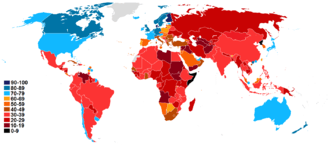Corruption in Germany
| Political corruption |
|---|
 |
| Concepts |
| Corruption by country |
| Europe |
| Asia |
| Africa |
| North America |
| South America |
| Oceania and the Pacific |
| Transcontinental countries |
Corruption in Germany is examined on this page.
Extent
Transparency International’s Global Corruption Barometer 2013 reveals that political parties and businesses are the most corrupt institutions in Germany. The same report also indicates that petty corruption is not as uncommon as in other European countries. The survey shows that 11% of the respondents claim to have been asked to pay a bribe at one point in their life and only few of those said that they had refused to pay the bribe.[1]
According to Freedom House's report, Germany’s ability to ensure integrity and to prevent corruption in state bodies is generally sufficient due to a strong institutional setup.[2]
Regarding business and corruption, business executives from World Economic Forum Global Competitiveness Report 2013-2014 consider tax regulations and restrictive labour regulations as the most problematic factors for doing business. They also report that trust in the ethical standards of politicians is relatively high, and that irregular payments and bribes only rarely take place in relation to public services.[3]
See also
References
- ↑ "Global Corruption Barometer 2013". Transparency International. Retrieved 6 December 2013.
- ↑ "Freedom in the World 2013- Germany". Freedom House. Retrieved 6 December 2013.
- ↑ "Global Competitiveness Report 2013-2014". World Economic Forum. Retrieved 6 December 2013.
